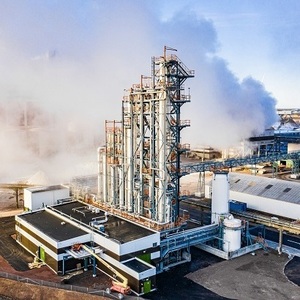Swedish firm Södra delivers biomethanol to Danish biodiesel maker

Photo: Södra
February 25, 2020
BY Södra
Södra has built the world’s first plant for commercial biomethanol, a sustainable fuel from forest biomass, at its pulp mill in Mönsterås, Sweden. An initial pilot delivery in late February was expected to go to Emmelev A/S, a customer that will be using biomethanol in its biodiesel production.
Södra decided to invest in a biomethanol production facility in 2017. This initiative shows that Södra is working towards a circular economy, resource-efficiency and being fossil-fuel free.
Advertisement
“It is with pride that we have now started up the first commercial plant in the world for biomethanol,” said Henrik Brodin, strategic business development manager at Södra. “The transition to a bioeconomy means that all raw materials must be used efficiently. Biomethanol is produced from the crude methanol recovered from the manufacturing process at Södra’s pulp mills. It is part of the circular process that already exists in Södra’s mills, in which all parts of forest products are used for the best possible effect. With this step, we are showing the way to a fossil-free society, and it is fully in line with our own strategy for fossil-free transportation by 2030.”
The investment is also broadening Södra’s product portfolio with a new bioproduct.
Advertisement
“More and more people are realizing why we need to switch to fossil-free alternatives,” said Viktor Odenbrink, sales manager at Södra Cell Bioproducts. “That’s why it feels so great that we can bring biomethanol to the market as a substitute for fossil methanol in the transport sector as well as a chemical base. Demand for biobased products is favorable and we have long experience in delivering other bioproducts to the fuel and chemical industries. As we now continue to build on that, it feels particularly gratifying to have made a first pilot delivery to our customer Emmelev A/S. We are now looking forward to continuing the development of the product together with our customers.”
Emmelev A/S is a Danish family-owned agricultural company that has developed large-scale biodiesel production from local canola but uses fossil methanol as a raw material in production.
“Biodiesel will play a key role in the transition to a fossil-free Denmark and we are very happy that Swedish biomethanol will now be used in production,” said Morten Simonsen, co-owner of Emmelev A/S. “Our biodiesel will be 100 percent renewable and based on locally sourced raw materials. Biodiesel produced from Danish canola and Swedish forests can secure fuel supplies for heavy road transport, as well as buses and construction machinery. This will be crucial for a transformation of the energy sector. We emphasize local and regional production and consider Sweden part of our local area, and we have good relationships with Swedish companies. It therefore feels natural to be entering into an agreement with Södra.”
Related Stories
A notice published in the Federal Register by the U.S. EPA indicates that far fewer parties than originally anticipated have registered with the agency as biointermediate producers under the Renewable Fuel Standard.
With exclusive licensing to a camelina seed variety, Ash Creek Renewables is breaking down barriers to a renewable future.
The USDA reduced its estimate for 2024-’25 soybean use in biofuel production in its latest WASDE report, released May 12. The agency expects soybean oil use in biofuel to increase during the 2025-’26 marketing year.
HutanBio's microalgal biofuel production shown to be net-negative in an independent life cycle assessment by EcoAct
HutanBio on May 8 announced that the production process for its proprietary HBx microalgal biofuel achieves net-negative carbon emissions, based on an independent cradle-to-gate life cycle assessment (LCA) conducted by EcoAct.
According to a new economic contribution study released by the Iowa Renewable Fuels Association on May 6, Iowa biofuels production has begun to reflect stagnant corn demand throughout the agriculture economy.
Upcoming Events










